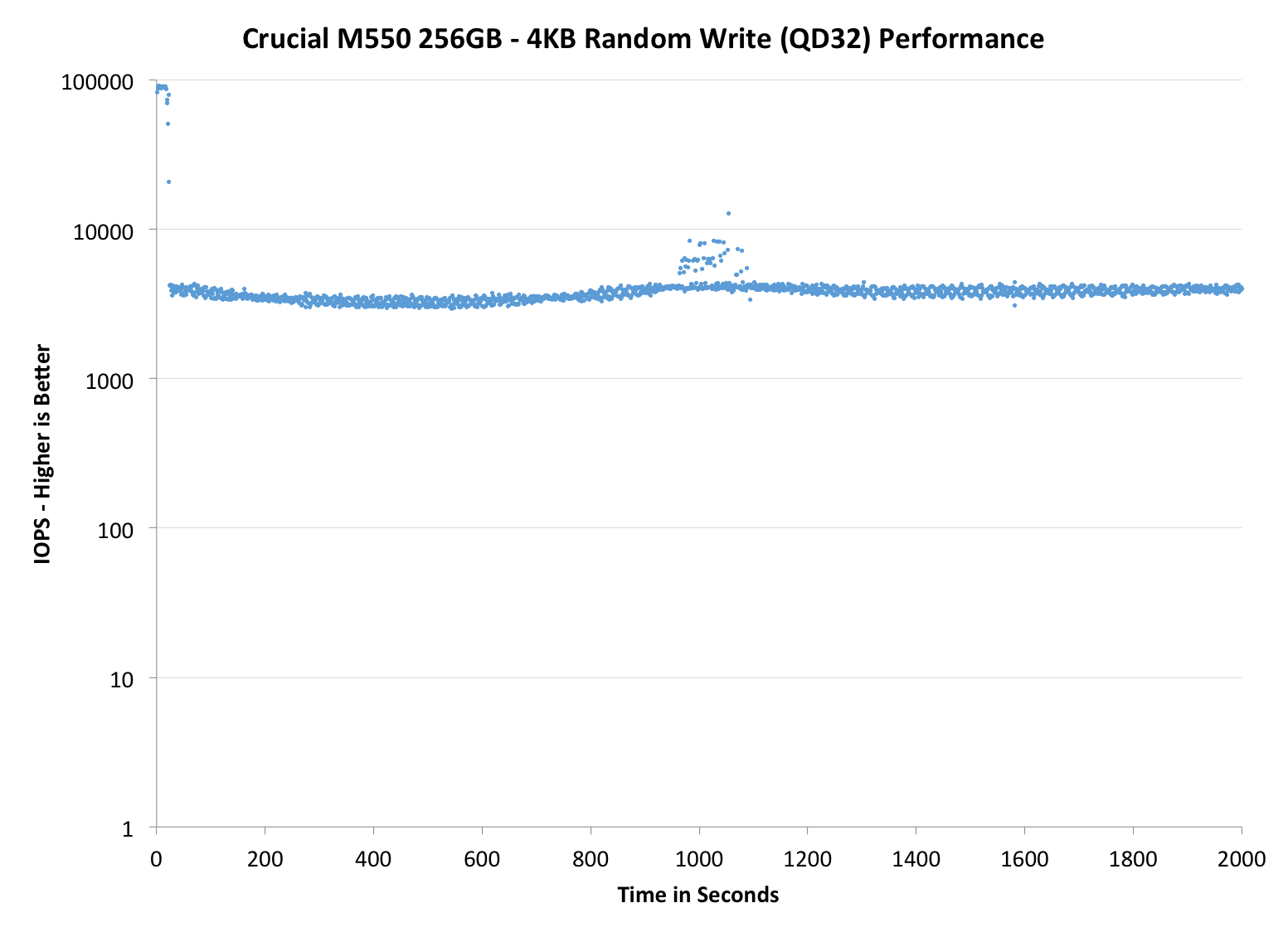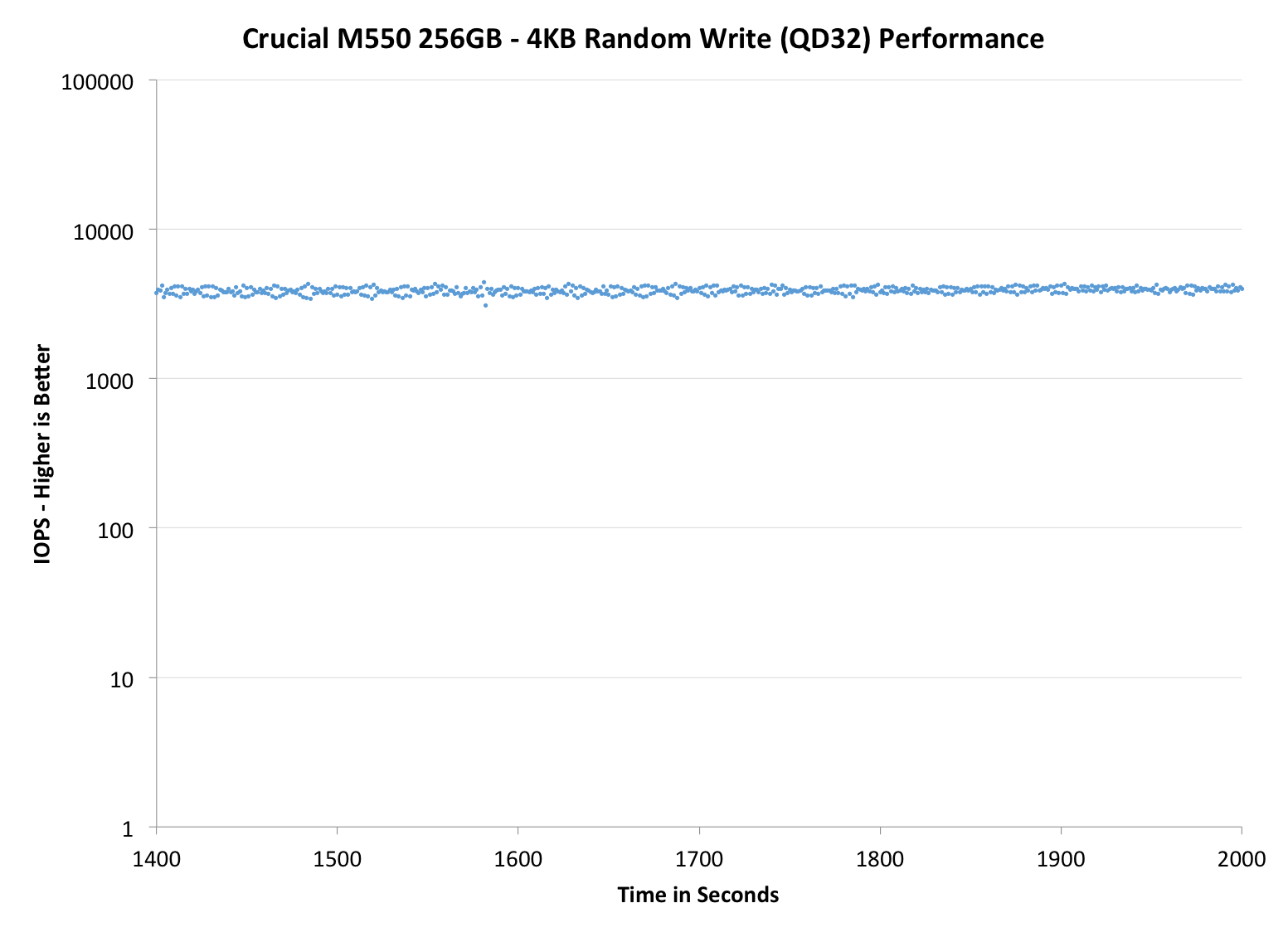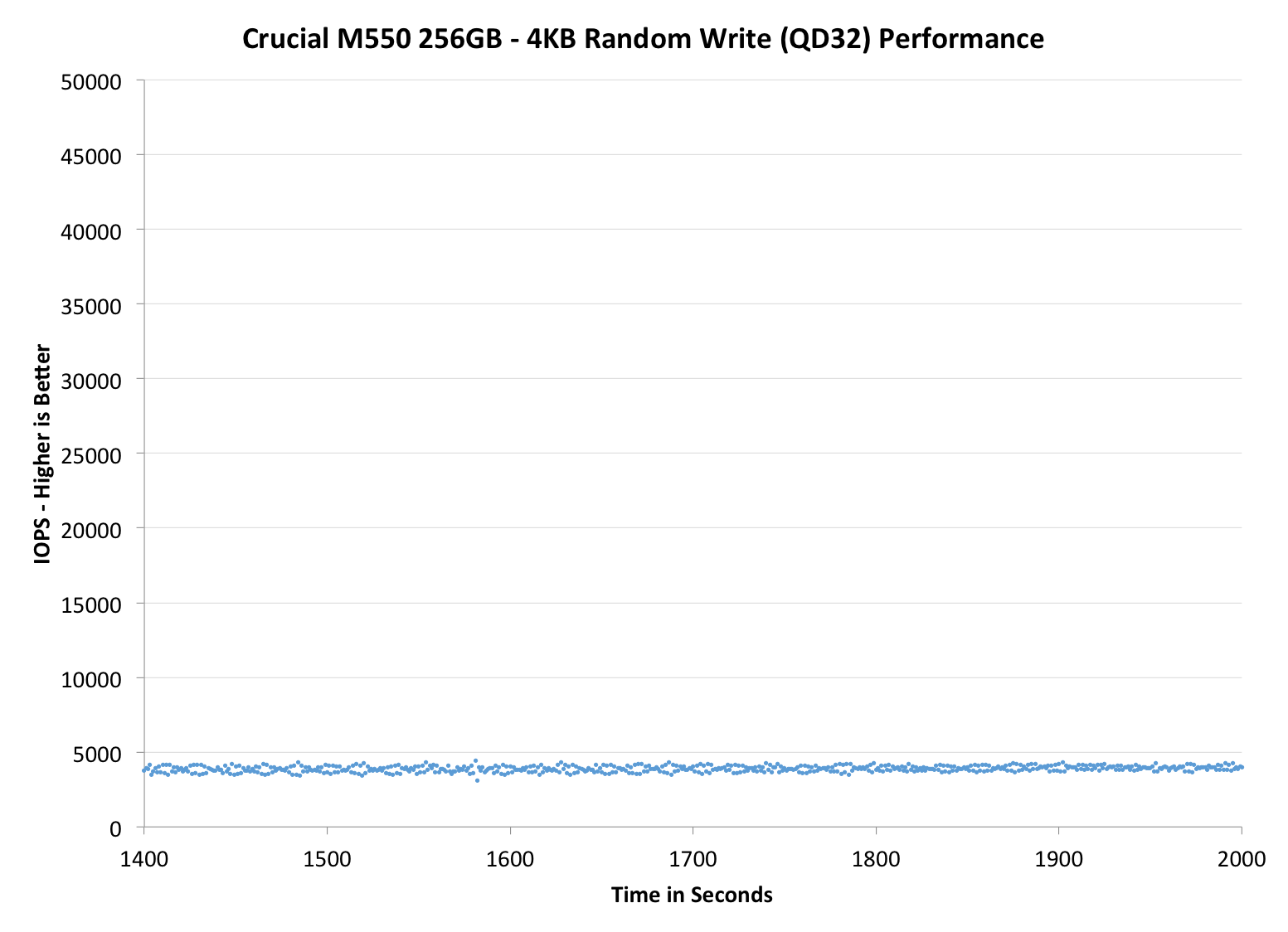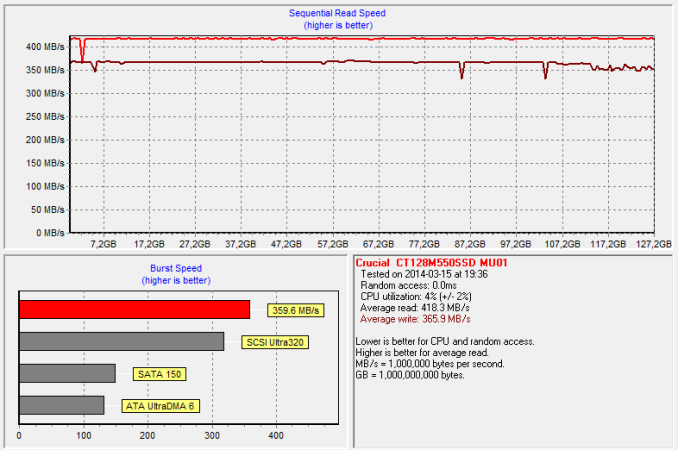Crucial M550 Review: 128GB, 256GB, 512GB and 1TB Models Tested
by Kristian Vättö on March 18, 2014 8:00 AM ESTPerformance Consistency
Performance consistency tells us a lot about the architecture of these SSDs and how they handle internal defragmentation. The reason we don’t have consistent IO latency with SSD is because inevitably all controllers have to do some amount of defragmentation or garbage collection in order to continue operating at high speeds. When and how an SSD decides to run its defrag or cleanup routines directly impacts the user experience as inconsistent performance results in application slowdowns.
To test IO consistency, we fill a secure erased SSD with sequential data to ensure that all user accessible LBAs have data associated with them. Next we kick off a 4KB random write workload across all LBAs at a queue depth of 32 using incompressible data. The test is run for just over half an hour and we record instantaneous IOPS every second.
We are also testing drives with added over-provisioning by limiting the LBA range. This gives us a look into the drive’s behavior with varying levels of empty space, which is frankly a more realistic approach for client workloads.
Each of the three graphs has its own purpose. The first one is of the whole duration of the test in log scale. The second and third one zoom into the beginning of steady-state operation (t=1400s) but on different scales: the second one uses log scale for easy comparison whereas the third one uses linear scale for better visualization of differences between drives. Click the buttons below each graph to switch the source data.
For more detailed description of the test and why performance consistency matters, read our original Intel SSD DC S3700 article.
 |
|||||||||
| Crucial M550 | Crucial M500 | Intel SSD 730 | SanDisk Extreme II | Samsung SSD 840 EVO | |||||
| Default | |||||||||
| 25% Spare Area | - | ||||||||
I can't say I'm very pleased with the IO consistency of the M550. There is a moderate increase (~4K IOPS vs 2.5K in M500) in steady-state performance but other than that there isn't much good to say. All the other higher-end drives run circles around the M550. I should note that the M550 does have considerably less over-provisioning than the other drives but even at 25% OP the results aren't pretty. There is huge variation in performance and the graphs with additional spare area certainly look quite abnormal, but the IOPS is still mostly below 5000. There are peaks of over 50K IOPS too but personally I would prefer a steady line (like the SSD 730) instead of this constant up and down. In client workloads the variation in IOPS isn't as critical as in the enterprise (where predictable performance is a must) but there can be an impact on performance in IO intensive scenarios.
 |
|||||||||
| Crucial M550 | Crucial M500 | Intel SSD 730 | SanDisk Extreme II | Samsung SSD 840 EVO | |||||
| Default | |||||||||
| 25% Spare Area | - | ||||||||
 |
|||||||||
| Crucial M550 | Crucial M500 | Intel SSD 730 | SanDisk Extreme II | Samsung SSD 840 EVO | |||||
| Default | |||||||||
| 25% Spare Area | - | ||||||||
TRIM Validation
To test TRIM, I took a secure erased drive and filled it with sequential data. Then I tortured the drive with 4KB random writes (QD32) for 30 minutes followed by a TRIM command (quick format in Windows). Finally I measured performance with HD Tach to bring you the graph below:
And as you should expect, TRIM works.











100 Comments
View All Comments
anh14 - Thursday, March 20, 2014 - link
you nailed that ; all differences are just academic . Everyone always talks about 'faster' but not about how preventing it of making your computer slower i.e. taking your storage of the critical paththe only thing with the earlier SSD's are some of them become excessively slow and resetting them is a pain.
I have a stack of patriots 32Gb that are collecting dust and that OCZ Vertex 2 64 SSD, interesting you mentioned it, I do have that one still but it is my backup C-disk that is in my drawer (e.g. if things go south, I replace the intel 520 I am now using have with this guy which is still better than any slow poke HD)
nathanddrews - Tuesday, March 18, 2014 - link
Coming from a HDD, any modern SSD will be subjectively comparable. Unless you've got a really read or write heavy task, it's really just splitting hairs. I've owned eight SSDs since I bought my first 80GB Intel SSD and I still have all of them in working order (only the largest/newest ones are boot drives, the rest are in external enclosures or serve as scratch drives). Anyway, until we get an interface with considerably higher speed (1-2GBps) and a cost per GB of $0.25 (2TB SSD for $500), the SSD market is just boring IMO.hojnikb - Tuesday, March 18, 2014 - link
We are already headed to sata-express + flash is rapidly getting cheaper nowdays, so 2TB ssd for a reasonable price is not that far away. Another dieshrink (so we get 256Gbit dies) and maturing of sata-express controllers and this will become a reality.jospoortvliet - Thursday, March 20, 2014 - link
Prices haven't really been going down all that fast lately so I wouldn't count on it anytime soon.dishayu - Thursday, March 20, 2014 - link
Sadly,I have to agree with this. I bought a 128GB Plextor M5 in mid 2012 for 84$. That's still the price point where 128GB SSDs sell today.hojnikb - Thursday, March 20, 2014 - link
You do realize u got a heck of a deal for that ssd, right ?Death666Angel - Friday, March 21, 2014 - link
Prices for small capacity SSDs have been relatively stable, but the 256/512 sizes have really dropped. I remember buying a 500GB Samsung 840 for 320€ (December 2012) and the equivalent Evo 500GB now costs 210€.hojnikb - Thursday, March 20, 2014 - link
I disagree.Just check m500 prices lately..
HisDivineOrder - Tuesday, March 18, 2014 - link
Pricing is the thing they need. Performance gets ridiculous past a certain point with the given ports we have.GASOLINENL - Tuesday, March 18, 2014 - link
I read a very technical article about this. In theorie SSD's survive 75 years. Due to different things a very heavy user (lots of writing etc) will kill a SSD after 25!!!! years. So they are great.